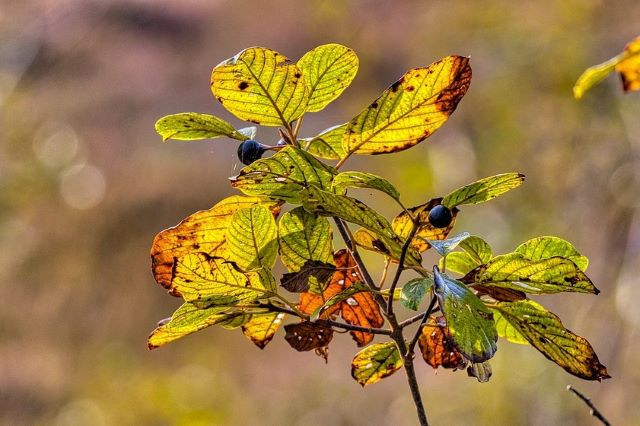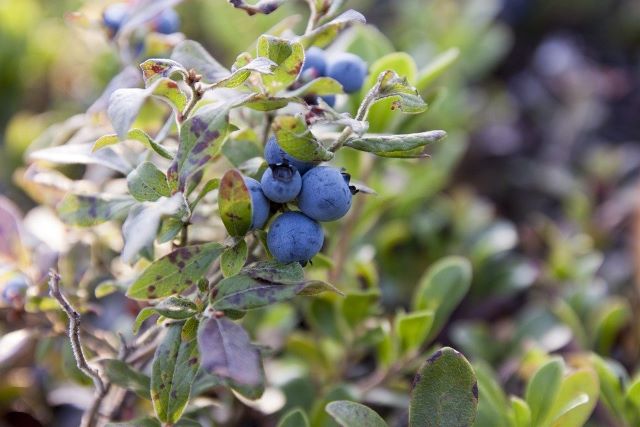Is your blueberry bush dying? Dying plants can be sad, especially when you don’t know what to do about it. But it isn’t the end— most dying blueberries can be saved before it’s too late. Read on to find out more about why your blueberry bush might be dying, and what you can do about it.

There can be many reasons a blueberry bush is dying, and most of them can be treated. The most common ones are:
- The soil isn’t acidic enough
- There’s too much fertilizer in the soil
- You’ve been over-watering or the soil is too wet
- Sun scorch— the plant got sunburnt
- Diseases like root rot and blight
- Pests like deer, rabbits, and small bugs
In most cases, these issues can be treated, so no need to despair just yet! There’s still hope for your delicious blueberries.
Table of Contents
1. The Soil Isn’t Acidic Enough For Blueberries
Most common garden plants need soil that is fairly neutral, not too basic or acidic. Blueberries, however, need more acidic soil to thrive. Blueberry bushes grow best in soil with a pH between 4.5 and 5. Because most people don’t know this, it’s very common for blueberries to be in soil that isn’t acidic enough.
The only reliable way to know the acidity of your soil is to test it. You can buy pH testing kits like this one here. Once you get one of these, you can test your soil to find out how acidic it is.
If the pH level is about 5, then that’s a likely cause for your blueberry bush dying. Luckily enough, though, there are ways of making the soil more acidic and saving your blueberries.
Fixing Non-Acidic Soil
Adding well-decomposed compost to your soil will help, as can coffee grounds. Organic mulch, especially those made with pine needles or oak leaves, can also be helpful. These materials will break down over time, releasing more acid into the soil.
These can take time to work. If your blueberry bush isn’t in too bad shape, then try these out and keep taking good care of it, and it will hopefully be ok.
If you need a faster solution, you can use an organic soil acidifier such as this one. It works by decreasing the alkalinity of the soil which helps to adjust the acidity of the soil, making it ideal for growing blueberries.
2. Blueberry Bush Has Too Much Fertilizer
Gardeners know that fertilizer is important for plants. But, like with soil acidity, blueberry bushes aren’t like most plants. They don’t need a lot of fertilizer to grow well, and too much of it can be harmful.
In fact, in their first year of life, blueberries usually don’t need any fertilizer. So if your plants are very young, avoid fertilizing them until they get older.
Once grown, blueberries still don’t need a lot of fertilizer. Typically, a little bit once a year is enough for them to grow. Yes, under-fertilizing can be a problem, but so can over-fertilizing.
Most commonly, too much fertilizer will lead to having too much nitrogen in the soil. If you know you’ve been fertilizing your berries a lot, that could be your problem. Otherwise, testing the nitrogen levels in your soil can be helpful.
Solution For Too Much Fertilizer
If your soil is high in nitrogen, it’s time to stop fertilizing. If you put a decomposing fertilizer in the ground that you can remove, that might be a good idea. Watering the soil a lot can also help to clear out the excess nutrients, although you have to be careful not to overwater the plants.
If none of these are enough to get out the extra nutrients, it could be bad news for your blueberries. You can try transplanting them and replacing the soil, but that can cause a lot of stress on the plants. Generally, try to only fertilize once a year, and you can hopefully avoid this problem.
3. Over-Watering Blueberry Bush
Although blueberries need a good amount of water, they don’t like sitting in extra water. If there’s too much water in the soil, it can weigh down the roots, making it harder for the plant to absorb nutrients. It can also lead to root rot, which is another potential cause of blueberry plants dying.
Generally, blueberry bushes need about 1 inch of water a week, with up to 4 inches a week during the fruiting season. The soil should remain damp, but not be overly muddy or waterlogged.
Solving Over-Watering
If you notice that the soil is overly damp and the plant seems to be struggling, it could be time to ease up on the watering. Try to let the soil dry out some more before watering it again. Also keep an eye out for root rot, which we’ll talk about some more soon.
If your blueberries are in a pot, it’s even more important to provide them with well-draining soil, so they don’t get waterlogged. You can also try adding in perlite or other mixes, or even putting some gravel at the bottom of the pot. All of these can help prevent water from building up.
The only real way to improve over-watered blueberries is to give them time and let them dry out. To prevent the issue from happening, remember to only give about 1 inch of water a week, with more during the fruiting season, depending on temperature. You can always water them again later in the day, but it’s hard to remove water, so err on the side of caution.
4. Blueberry Bush is Sun Scorched
A very common issue for blueberry plants is sun scorch. This occurs when the plant gets too much sun, and it damages the leaves. It’s just like sunburn for humans (except giving the blueberries aloe vera won’t help.)
Sun scorch is easy to spot, as the leaves will start to wilt, turn brown, and dry out. Make sure to plant your berries in areas that get a few hours of direct light, but aren’t exposed to direct sunlight all day long during the hottest parts of summer.
Fixing Sun Scorched Blueberries
Planting blueberries near corners can be helpful, as the walls can help protect from the sun. You can also plant them near other tall plants, like tomatoes or cucumbers, that will help protect them from the sun in the warmest weather.
If you can’t find a good spot for your berries, or they seem to be getting scorched anyway, try sun nets. These are pieces of mesh that can be draped over your bushes, and will help protect their leaves from the harsh sunlight.
As with anything, the key is patience. Even if you put them in a less sunny spot, it will take some time for the plant to recover. Keep taking care of them, let them adjust to their new surroundings, and they will hopefully recover soon.
5. Blueberry Bush Diseases

Like most delicious plants, disease can be a problem for blueberry bushes. There are a lot of potential berry diseases out there, but the two you’re most likely to see are root rot and blight. Luckily, you should be able to treat both.
Blueberry Bush Root Rot
Root rot occurs when the soil gets too wet for too long, and the roots start to become compacted. They will be held down by the soil, and struggle with drawing up nutrients. This then causes the rest of the plant to struggle.
The most common way root rot shows up is through the yellowing of the plant’s leaves and stems. Over time, the tips will yellow and begin to die, and then the rest of the plant will. If you look at the roots, you are also likely to see a lot of white stuff around them, from the buildup of the water.
Fixing Root Rot
Should you discover your blueberries do have root rot, you have two options. If it isn’t too bad, you can simply let the soil dry out before watering again, and then be more careful with water. This should give the plant the time it needs to heal.
If it’s more severe, you may have to dig up the plant, gently clean off the roots, and place it back into dry, well-draining soil. Doing this can be stressful on the plant, so be careful. And be sure to treat it well once you’re done— just because you did that doesn’t mean the root rot is gone yet, so you still need to be gentle on the water.
Blueberry Bush Blight
Blight, on the other hand, can be harder to deal with. Blight is the common name for a variety of diseases that affect common garden plants. It often appears first as small brown spots on the blueberry bush leaves, which will then start to wither, followed soon by the canes.
Even though blight is often a fungal problem, fungicides usually won’t help. Instead, you have to act quickly and carefully to stop blight in its tracks.
Fixing Blueberry Bush Blight
As soon as you notice signs of blight on your blueberry plant, remove the infected areas. Don’t just remove the unhealthy-looking parts, but cut the canes a few inches below that. This will hopefully also remove any other parts that could be infected.
Other than that, your best bet is to be careful to avoid leaving open wounds on the plants, and try planting varieties of blueberry that are more resistant to it. If the blight has already spread to most of the plant, sadly, it may be too late.
6. Blueberry Bush Pests
Blueberries are delicious, which is probably why you’re growing them. But that also means that a lot of pests enjoy the blueberries too, and they can make it difficult to keep your plants alive.
Deer and Rabbits
Some of the more common pests, like deer and rabbits, are typically easy to deal with. Putting up fences around your blueberry bushes can be very helpful. If that isn’t enough, you can try scattering human hair (like from an at-home haircut) around the base of the plants. The scent of people tends to scare off the critters that like to snack on your berries.
Birds
Birds can also be a big problem, and usually, fences won’t keep them out. You can try putting reflective tape on the bushes, or reflective pinwheels that spin in the wind. The movement and bright light will scare away most birds. If that doesn’t help, you can also try putting up bird netting to protect your plants like this one.
Bugs on Blueberry Bush
Another common pest for blueberry bushes is bugs. From aphids to insects, there are a lot of bugs that might enjoy snacking on your blueberries. Luckily, there are a few ways to get rid of them.
Getting Rid of Bugs on Blueberry Bush
Sometimes, washing down the plant is enough to rid it of bugs. Give it a good spray with the hose (careful not to be too rough) and it will wash away all of the pests.
You can also try adding diatomaceous earth such as this one into your soil. This will kill most bugs that are bothering your berries— however, it will also kill most other bugs, so if you have bugs you don’t want to get rid of, you may want to avoid using this.
Horticultural neem oil is one of my favorite forms of organic pest control. It’s gentle on the environment but very effective in pest management.
Lastly, you can fight bugs with… more bugs! There are certain types of bugs that are minimally harmful to blueberries, and can help get rid of the more harmful pests. Spiders, ladybugs, and assassin bugs are all great options.
You can get these bugs from some plant stores, or order them online. Introducing them to your garden will hopefully help you keep away the more annoying little critters that bother your berries.
Final Thoughts
From sun scorch to over-watering to pesky aphids, there are a lot of issues that can plague blueberry plants. Luckily, most of them can be prevented and/or treated, so you don’t have to lose your plants.
- How To Grow Blueberries: Planting, Caring and Harvesting
- Why Blueberry Bush Flowers But No Fruit (With Solutions)
- Why Are My Blueberries So Small? Causes And Solutions
- What’s Eating My Blueberries? With Solutions

